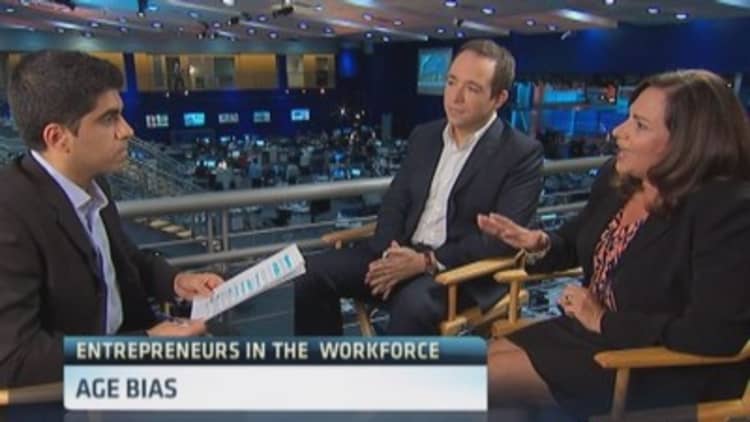Chances are, that millennial you caught in your office applying to other jobs is not the only one. But that may not be such a bad thing.
According to a report from the U.S. Department of Labor's Bureau of Labor Statistics, the median tenure of workers ages 25 to 34 is only three years—less than a third of the tenure among people aged 55 to 64 years old.
The study, conducted every two years, is slightly down from 2012 when millennials' median tenure was 3.2 years, while the number sneaked higher for older workers.
In spite of the youth underemployment rate peaking after the 2008 financial crisis, the data for the younger generation hasn't changed drastically, but has steadily risen for older workers.
Across all age groups, the median tenure for men is slightly higher—a trend that has stayed consistent for at least the past decade.
Read More Millennials may be more like boomers than we realize
According to Michael Parish Dudell, a millennial workplace expert and author of "Shark Tank Jump Start Your Business," younger workers prioritize work that feels meaningful over salary, which may be one cause for high turnover.
Given high youth unemployment in recent years and the rise of freelancers, it's likely that this generation will work for more employers than any other, he said.
"Unlike other generations, our professional fickleness is lasting well into the 30s...and beyond," Dudell told CNBC. "It's important for millennials to think strategically about their trajectory and fully understand the long-term implications of a vagabond career."

Of course, part of the stark contrast between the two age groups can be attributed to the fact that younger workers are simply newer to the job market than their older counterparts. Most boomers have been in the workplace more than 30 years, having had time to achieve tenure, even after exploring multiple jobs in their early careers. Another factor is older workers may not have the luxury of experimenting with a career change.
According to Kathy Caprino, a career coach who has worked with thousands of midlife professionals, the data is both surprising and gratifying. She said the "lack of loyalty we think is occurring with people ages 25-34 today isn't really happening."
In fact, 2014 exactly matches the average tenure for young workers as in 1983, when comparable data begun being tracked.
Caprino thinks it's not just acceptable, but important for younger workers to keep tenure low, as it can allow them to explore new opportunities and directions. She advised that millennials "not stay put for 10 years at one organization early on in their careers, because that can significantly reduce their compensation in the long term. And do the hands-on research necessary to identify the best direction for them over the long haul."
Read More Why millennials have a tough time landing jobs
According to a separate Department of Labor study conducted earlier this year, young people on average settle into a committed career at the age of 27.
The findings note that the majority of jobs held through the age of 26 were of relatively short duration, noting 57 percent of jobs held by 18-26-year-old workers ended in one year or less, and 71 percent ended in two years or less.
Notably, age 27 is also the the first year parents can no longer keep adult children on their employer health insurance plan.


